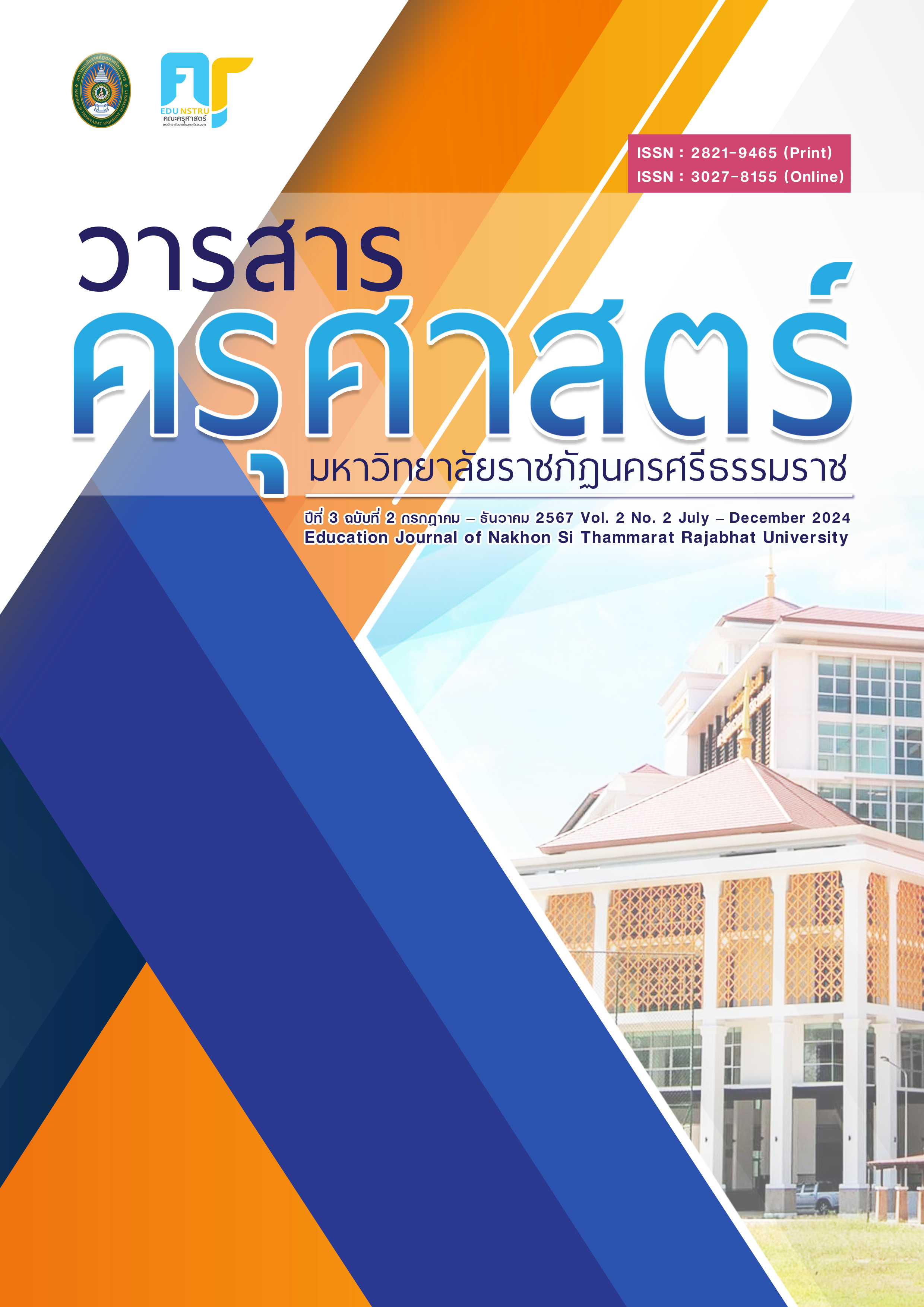การวิเคราะห์ความแตกต่างของรูปแบบการศึกษาไทยที่มีผลต่อผลลัพธ์ทางการเรียนของผู้เรียน
Main Article Content
บทคัดย่อ
บทความวิชาการฉบับนี้นำเสนอข้อมูลเกี่ยวกับระบบการศึกษาไทยที่มีผลต่อผลลัพธ์ทางการเรียนของผู้เรียนเพื่อวิเคราะห์ความแตกต่างของระบบการศึกษาแต่ละระบบของไทยในปัจจุบันตามที่กำหนดไว้ในพระราชบัญญัติการศึกษาแห่งชาติ พ.ศ. 2542 แก้ไขเพิ่มเติม (ฉบับที่ 2) 2545 ผลลัพธ์ทางการเรียนในที่นี้หมายถึง การพัฒนาทักษะ ความรู้ ความสามารถ และการปรับตัวของผู้เรียนที่เกิดจากกระบวนการศึกษาต่าง ๆ ซึ่งครอบคลุมการพัฒนาองค์ความรู้ การเสริมสร้างทักษะชีวิตและวิชาชีพ การปรับตัวในการดำรงชีวิตในสังคม และการเรียนรู้ที่ต่อเนื่องตลอดชีวิต
ผลการวิเคราะห์พบว่า การศึกษาในระบบมีการกำหนดโครงสร้างการเรียนรู้และหลักสูตรอย่างชัดเจน รวมถึงมีเกณฑ์การวัดและประเมินผลที่แน่นอน ส่งผลให้ผู้เรียนสามารถพัฒนาทั้งในด้านวิชาการและทักษะที่จำเป็นสำหรับการศึกษาต่อในระดับสูงขึ้น ในขณะที่การศึกษานอกระบบมีความยืดหยุ่นในด้านเนื้อหา รูปแบบ และระยะเวลา ส่งผลให้ผู้เรียนสามารถพัฒนาทักษะที่สอดคล้องกับความต้องการและสภาพแวดล้อมของตนเอง แม้ว่าจะไม่มีการประเมินผลอย่างชัดเจนก็ตาม ส่วนการศึกษาตามอัธยาศัย ผู้เรียนสามารถเรียนรู้ตามความสนใจและศักยภาพของตนเองจากแหล่งเรียนรู้ต่าง ๆ โดยไม่มีการวัดผลอย่างเป็นทางการ แต่มีการเรียนรู้อย่างต่อเนื่องตลอดชีวิต
จากการศึกษานี้พบว่า ระบบการศึกษาทั้งสามมีผลลัพธ์ทางการเรียนที่แตกต่างกันไปตามลักษณะของระบบ โดยระบบที่มีโครงสร้างชัดเจนและมีการประเมินผลแน่นอนจะส่งเสริมความพร้อมในการศึกษาต่อ ในขณะที่ระบบที่มีความยืดหยุ่นสูงช่วยให้ผู้เรียนพัฒนาทักษะตามความต้องการเฉพาะบุคคลได้อย่างมีประสิทธิภาพ
Article Details

อนุญาตภายใต้เงื่อนไข Creative Commons Attribution-NonCommercial-NoDerivatives 4.0 International License.
บทความที่ได้รับการตีพิมพ์เป็นลิขสิทธิ์ของวารสารครุศาตร์ มหาวิทยาลัยราชภัฏนครศรีธรรมราช
ข้อความที่ปรากฏในบทความแต่ละเรื่องในวารสารวิชาการเล่มนี้เป็นความคิดเห็นส่วนตัวของผู้เขียนแต่ละท่านไม่เกี่ยวข้องกับวารสารครุศาสตร์ มหาวิทยาลัยราชภัฏนครศรีธรรมราช
เอกสารอ้างอิง
Aekun, P. (1999). Thai education. Bangkok: Faculty of Education, Suan Sunandha Rajabhat University.
Boonwatthanakul, C. (2016). Direction for Providing Nonformal and Informal Education for Thailand. Veridian E –Journal,Silpakorn University, 9(3), 984-1004. Retrieved from https://he02.tci-thaijo.org/index.php/Veridian-E-Journal/article/view/75630/60913 (in Thai)
Department of Learning Encouragement : DOLE. (2012). Research report on the evaluation of the performance of non-formal and informal education. According to the Act on the Promotion of Non-Formal and Informal Education, B.E. 2008. Bangkok: Rang Printing
Department of Non-Formal Education. (1995). Lifelong education (2nd ed.). Department of Non-Formal Education.
La-Hay, M. (2017). Non Formal and Informal Education Needs of the Learners in Pattani Province (Master’s thesis). Songkla: Songkla University. Retrieved from https://kb.psu.ac.th/psukb/bitstream/2016/11842/1/TC1483.pdf (in Thai)
Media Thailand. (2012, May 28). Formal education. Media Thailand. https://www.mediathailand.org/2012/05/blog-post_3505.html (in Thai)
Ministry of Education. (2017). National Qualifications Framework (Thailand NQF) revision edition. Bangkok: Ladprao Teachers Council. Retrieved from https://ir.rmutsv.ac.th/sites/ir.rmutsv.ac.th/files/Thailand%20NQF_0.pdf (in Thai)
Thipakorn, B. (2016). Why does everyone talk about learning outcomes. KMUTT. https://www.c4ed.kmutt.ac.th/copy-of-my2satangstqf (in Thai)
Leicht, A., Combes, B., Byun, W. J., Agbedahin, A. V. (2018). Issues and trends in Education for Sustainable Development “Chapter 1 From Agenda 21 to Target 4.7:the development of Education for Sustainable Development” [K. Hanirattisai, Trans] Bureau of International Cooperation, MOE. https://bic.moe.go.th/index.php/gallery/2021-08-29-21-34-25/320-issues-and-trends-in-education-5-4-61 (in Thai)
Ongsanuea. (2023, February 9). Listen to Thailand education options. Thai PBS. https://thecitizen.plus/node/71793 (in Thai)
Paiboon, S. (1990). Principle of educational system development in Thailand. (in Thai)
Pan-iem, K. (2018). Effect on education norms in secondary school through students' narrative approach (master’s thesis). Nakhon Pathom: Silpakorn University. Retrieved from http://ithesis-ir.su.ac.th/dspace/bitstream/123456789/2264/1/57260306.pdf (in Thai)
Sommai, P. (2015). The development of educational quality in Thailand during the transitionera. Journal of Curriculum Research and Development, 5(2), 123–140.
Thummake, P., & Phosing, P. (2019). Thai Higher Education: The Changes toward ASEAN Community. Humanities and Social Sciences Journal, Ubon Ratchathani Rajabhat University, 8(1), 110–130. Retrieved from https://so01.tci-thaijo.org/index.php/humanjubru/article/view/210248 (in Thai)
Thammawithikul, A. (2009, May 17). Non-formal Education. Panchalee's Blog. https://panchalee.wordpress.com/2009/05/17/non-formaleducation/
Tongchot, P. (2011). Student satisfaction toward educational management of formal education of Trat Province (Master’s thesis). Chanthaburi: Rambhai Barni Rajabhat University. (in Thai)
Tummons, J. (2012). Curriculum Studies in the Lifelong Learning Sector. New York City: SAGE Publications, Inc. DOI: https://doi.org/10.4135/9781526435781
UNESCO. (2015). Education 2030: Incheon Declaration and Framework for Action Towards inclusive and equitable quality education and lifelong learning for all. Moscow, Russian Federation. Retrieved from https://iite.unesco.org/publications/education-2030-incheon-declaration-framework-action-towards-inclusive-equitable-quality-education-lifelong-learning/


